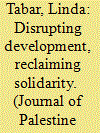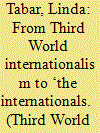| Srl | Item |
| 1 |
ID:
148619


|
|
|
|
|
| Summary/Abstract |
Originally developed for the Center for Development Studies at Birzeit University in 2011, this paper examines the humanitarian assistance that flooded the occupied Palestinian territories after the beginning of the second intifada (2000–2005). It provides a critical analysis of the international development aid that was directed at Palestinians in the West Bank and Gaza Strip, where the Oslo process was territorialized, to the exclusion of the vast majority of the Palestinian people. Today, Palestinians are challenging the dominant development discourse and neoliberal economic model set in place by the Oslo Accords, wherein development recast Israeli settler colonialism as an externality, which the putative Palestinian state-building project would transcend. Returning to Yusif Sayigh's view that development cannot occur under settler colonialism, Palestinians are articulating alternatives to the Oslo post-conflict paradigm that emphasize self-reliance and resistance. The discussion that follows situates itself as a contribution to this process by interrogating the anti-political bias of humanitarianism and charting how indigenous Palestinians are building alternatives to food aid.
|
|
|
|
|
|
|
|
|
|
|
|
|
|
|
|
| 2 |
ID:
151504


|
|
|
|
|
| Summary/Abstract |
This paper examines the formation of the concept of ‘the internationals’ in Palestine. The post-Oslo term began to be used in the second intifada to denote white solidarity activists in the colony. In tracing the rise of the concept, the paper charts some of the ways solidarity with the Palestinian people has been domesticated under the Oslo ‘peace process’. Situating and analysing the rise of the concept of ‘the internationals’ within the assemblage of apparatuses and ideological forces inscribed during Oslo, it explains how these material structures have contributed to shifting the notion and praxis of solidarity. Taking Third World internationalist and anti-imperialist feminist practices of solidarity as its starting point, the paper historicises and theorises some of the changes that have taken place over time. It offers an anti-colonial, anti-racist, feminist critique of the individualisation of solidarity and centres indigenous Palestinian perspectives. It concludes by surveying the ways Palestinians are creating alternatives and rebuilding international solidarity.
|
|
|
|
|
|
|
|
|
|
|
|
|
|
|
|
| 3 |
ID:
111232


|
|
|
|
|
| Publication |
2012.
|
| Summary/Abstract |
UNRWA's reconstruction of Jenin refugee camp following the massive destruction by Israel in April 2002 was the largest humanitarian intervention during the second intifada. This article uses the Jenin project as a lens through which to critically examine the minimalist humanitarian paradigm underwriting the agency's relief-centered mandate. Reviewing the negotiations between UNRWA planners and local refugee committees, the author highlights the tension between the agency's politically "neutral" technical vision and the refugees' needs and wishes. While recognizing UNRWA's crucial role, the author regrets that in expanding its operations beyond relief provision, the agency opted for a more traditional (liberal) community-based development framework rather than a rights-based approach, resulting in a depoliticization that undermines the community's struggle for its rights.
|
|
|
|
|
|
|
|
|
|
|
|
|
|
|
|